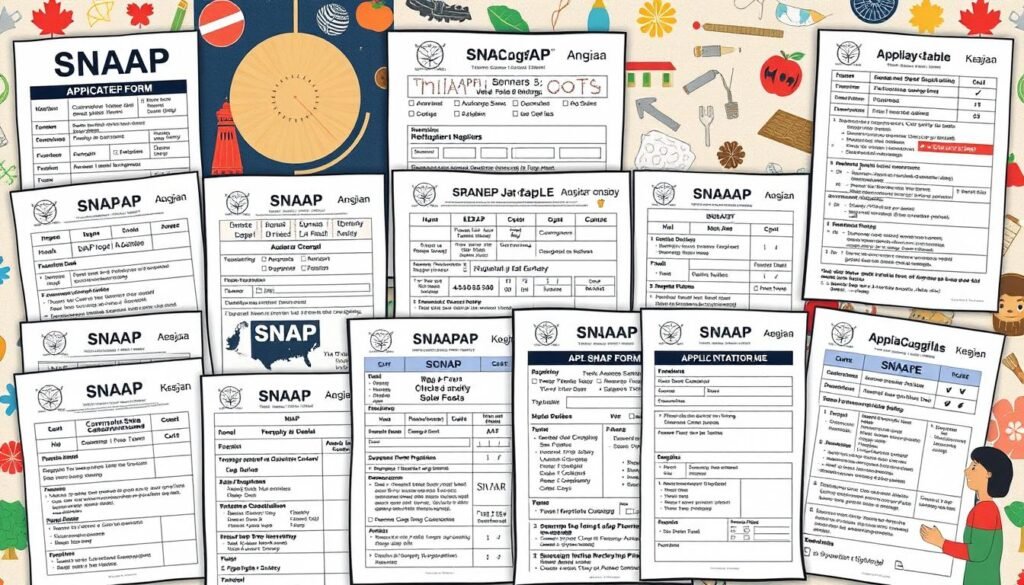No. SNAP helps U.S. citizens and some non-citizens who are here legally. But, undocumented immigrants can’t get SNAP, no matter their need. This rule has been in place for a long time.
SNAP, or “food stamps,” has rules for who can get help. Many wonder if undocumented immigrants can get these benefits. I’ll explain who can get SNAP and clear up any confusion.
Legal non-citizens, like green card holders or refugees, might qualify for SNAP. But, they must meet certain income and resource tests. Getting SNAP can be hard, with long waits and extra paperwork. After reading this article you will able to learn comprehensively about can illegal immigrants get food stamps or not.
Key Takeaways
- Undocumented immigrants and illegal aliens are not eligible for SNAP benefits.
- Legal non-citizens, such as permanent residents and refugees, may be eligible for SNAP, but must meet specific requirements.
- Applying for or receiving SNAP benefits does not make a non-citizen a “public charge” or negatively impact their immigration status.
- Organizations like food banks can provide information on community food assistance programs beyond SNAP.
- The CalFresh office will not disclose information to immigration enforcement agencies.
Who Is Eligible for SNAP Benefits?
SNAP, or food stamps, isn’t just for U.S. citizens. Lawfully present non-citizens can also get SNAP benefits. They must meet the program’s rules.
Eligibility Requirements for Non-Citizens
To get SNAP as a non-citizen, you must have a legal immigration status. This includes being a Lawful Permanent Resident, or green card holder. You also need to meet SNAP’s income and resource limits. These limits depend on your household size and other factors.
Special Rules for Afghan and Ukrainian Parolees
Afghan and Ukrainian nationals with parole have special rules. Afghan parolees who got parole between July 31, 2021, and September 30, 2022, can get SNAP right away. Ukrainian parolees who got parole between February 24, 2022, and September 30, 2023, can also get SNAP right away.
| Eligibility Criteria | Details |
|---|---|
| SNAP Eligibility Requirements for Non-Citizens |
|
| Special Rules for Afghan Parolees |
|
| Special Rules for Ukrainian Parolees |
|
Impact of Immigration Status on SNAP Eligibility
An individual’s immigration status is key to getting SNAP (Supplemental Nutrition Assistance Program) benefits. Undocumented non-citizens are not eligible. But, lawfully present non-citizens might qualify if they meet other rules. The rules depend on the person’s situation.
Recently, some states have started their own programs for SNAP benefits for immigrants. By 2021, only six states still offer this help: California, Connecticut, Illinois, Maine, Minnesota, and Washington. Most of the country follows federal rules that limit SNAP for non-citizens without legal permanent residency.
Eligible immigrants for SNAP include refugees, asylees, parolees, and victims of human trafficking. Also, Iraqi and Afghani immigrants with special visas, and adults with legal permanent resident status under certain conditions. Non-eligible individuals include those with temporary visas, immigrants who haven’t waited five years, and undocumented people without legal status.
In mixed-status households, where some members are eligible and others are not, a part of an ineligible person’s income is counted. This can affect the whole household’s eligibility and benefit amount.
It’s crucial to know that public charge rules don’t apply to many eligible groups for SNAP benefits, including green card holders. And most public benefits like SNAP don’t affect immigration status. But, cash assistance programs like TANF and SSI are considered in the public charge test.
Undocumented immigrants might be eligible for some benefits and can apply for their kids. Also, HRA won’t share personal info unless it’s required by law. Getting SNAP or other food help, along with health care like Medicaid, won’t hurt immigration cases.
Waiting Periods for Non-Citizens to Receive SNAP
Many non-citizens can get the Supplemental Nutrition Assistance Program (SNAP), also known as food stamps. But, they often have to wait before they can get these benefits. This wait is usually 5 years.
However, some groups don’t have to wait. For example, those with a military connection can get SNAP right away.
Military Connection and SNAP Eligibility
Active duty people, veterans, and their families don’t have to wait 5 years for SNAP. They can get it right away, no matter their immigration status. This helps military families who have made big sacrifices.
Also, qualified immigrants like refugees and asylees can get SNAP without waiting. This helps those who have faced a lot of hardship and are trying to start a new life in the U.S.
| SNAP Eligibility for Non-Citizens | Waiting Period |
|---|---|
| Active Duty Personnel, Veterans, and Their Families | No Waiting Period |
| Refugees, Asylees, and Victims of Trafficking | No Waiting Period |
| Other Qualified Immigrants | 5-Year Waiting Period |
The rules for getting SNAP can change based on your immigration status and where you live. Talking to a local SNAP office can help figure out if you qualify and how long you might have to wait.
Providing Proof of Immigration Status and Social Security Number
To get SNAP benefits, non-citizens must show their immigration status. This can be a green card, visa, or other documents. They also need a Social Security number or proof they’re applying for one.
If a non-citizen is applying for others, they don’t need to show their own Social Security number or immigration status.
Non-citizens who are exempt from the public charge rule can get SNAP benefits. This includes those with a green card, U.S. citizenship, refugee status, or certain visas. They don’t need to show their Social Security number or immigration documents.
- Some immigrants, like U Visa applicants and human trafficking survivors, may get SNAP before getting a Social Security number.
- Families with undocumented immigrants can get SNAP for eligible members. The SNAP office only reports undocumented individuals if there’s proof of unlawful presence.
Using SNAP benefits doesn’t hurt someone’s lawful permanent resident status or citizenship eligibility. Immigrants can ask for a fair hearing if they disagree with a SNAP worker’s decision. Food banks can also help, no matter the immigration status.
“In cases where policies change, individuals can seek help and information from legal aid services to make informed decisions regarding benefits eligibility.”
Can Illegal Immigrants Get Food Stamps?
No, undocumented immigrants can’t get food stamps. Food stamps help low-income people buy food. To get them, you must be a U.S. citizen or a certain non-citizen.
Undocumented immigrants can’t get food stamps. This is because they don’t meet the program’s rules. These rules are based on immigration status.
But, some states help those who can’t get federal food stamps. For example, California has a program for low-income immigrants. They also want to help more immigrants over 55.
| Program | Eligibility Requirements | Average Benefits |
|---|---|---|
| Supplemental Nutrition Assistance Program (SNAP) | U.S. citizens and certain lawfully present non-citizens | $121 per month (national average) |
| California Food Assistance Program (CFAP) | Low-income immigrants with legal status | $165 per month |
Even though illegal immigrants can’t get SNAP, people want to help more. They want to make sure everyone gets food help, no matter their immigration status.
Applying for SNAP as a Non-English Speaker
If you don’t speak English well, you can still get SNAP (Supplemental Nutrition Assistance Program) benefits. State agencies must offer SNAP application services and information in many languages. This makes sure food stamp help for those who don’t speak English is available.
At your local SNAP office, you can ask for translation services for SNAP. They will help you understand how to apply and what you need to qualify. They want to make sure you know how to get help.
The SNAP program makes sure everyone can get help, even if they don’t speak English well. State agencies must help by giving language services. This includes interpreters and materials in other languages, for free.
By working with the SNAP office staff, you can apply for food help. You can get the help you need, even if English is not your first language.
“The SNAP program is committed to serving all eligible individuals, regardless of their English language proficiency. We strive to make the application process as accessible as possible.”
SNAP Eligibility and Public Charge Concerns
The public charge rule worries many immigrants and their families. It looks at if someone might use government benefits. But, getting SNAP (Supplemental Nutrition Assistance Program) benefits doesn’t mean you’re a “public charge.” It also doesn’t hurt your immigration chances.
Applying for Other Household Members
You can apply for SNAP for your family, even if you can’t get it yourself. Your family’s income and stuff will still be checked. The public charge rule won’t hurt most green card holders or certain immigrants, like refugees and DACA recipients.
The new public charge rule starts on December 23, 2022. It won’t count against certain groups, like Afghan and Ukrainian parolees. Also, DHS won’t look at public benefits for some noncitizens when deciding on public charge.
| Metric | FY 2016 | Pre-Pandemic FY 2020 |
|---|---|---|
| SNAP Participation Rates Among Citizen Children Living with Noncitizen Adults | 80% | 54% |
| SNAP Participation Rates Among All Individuals | 83% | 80% |
SNAP use by noncitizens and U.S. citizen kids with noncitizen parents dropped a lot. This gap grew from FY 2016 to FY 2020 before the pandemic.
The Myth of Deportation for Receiving SNAP Benefits
Many think getting SNAP (Supplemental Nutrition Assistance Program) benefits means you could get deported. But this is not true. Getting SNAP does not hurt your immigration status or make you a public charge. You can apply for SNAP without worrying about deportation or immigration problems.
Immigrants with postponed deportation can get Food Stamps. Also, legal immigrants who were 65 or older on 8/22/1996 can apply too. Plus, immigrants with a Greencard for 5 years or more can join the Food Stamp program. And, documented immigrants with a total of 10 or more years of work in the US, including undocumented work, are also eligible.
Undocumented immigrants can’t get Food Stamps. But, qualified immigrant children can get SNAP and don’t face a five-year ban. Also, seven states provide state-only funded nutritional assistance to other qualified immigrants not eligible for SNAP due to the five-year ban.
“Zero cases of the state agency collaborating with ICE for deportation efforts related to the SNAP or Food Stamp Program in Maryland have been reported.”
If you’re an immigrant, you can apply for SNAP without fear of deportation or immigration issues. The SNAP program helps low-income families, no matter their immigration status. It’s there to support you, so don’t avoid it because of deportation myths.
SNAP Participation Among Eligible Non-Citizen Households
Many non-citizen households are eligible for SNAP but don’t use it. This is because of misunderstandings about SNAP rules. Some think green card holders or those with undocumented family members can’t get help. It’s important to clear up these myths so eligible non-citizens can get the food help they need.
Common Myths About SNAP for Non-Citizens
- Myth: Green card holders and individuals with family members who are undocumented cannot receive SNAP benefits.
- Myth: Receiving SNAP benefits will lead to deportation.
- Myth: SNAP eligibility is limited to U.S. citizens only.
But, the truth is many non-citizens, like green card holders, can get SNAP. Yet, SNAP use by eligible non-citizens and their citizen kids has dropped a lot. This makes the gap with overall SNAP use bigger.
This drop is due to bad policies, like the 2019 public charge rule. Also, the COVID-19 pandemic and anti-immigrant talk have hurt. We need to fix these issues so eligible non-citizens can get the food help they deserve.
“The negative impact of harmful anti-immigrant policy and rhetoric, including the 2019 public charge rule, has been associated with widening participation gaps in SNAP enrollment.”
Additional Financial Assistance for Lawfully Present Non-Citizens
SNAP is a big help for many non-citizens. But, it’s not the only aid out there. Lawfully present immigrants in the U.S. can find many other resources and benefits.
These financial aid for non-citizens programs help with food, housing, and more. Eligible non-citizen households should look into all the social services for eligible non-citizen households they can get. This way, they can meet their basic needs.
Some examples of other benefits for lawfully present immigrants include:
- Medi-Cal coverage, including emergency, pregnancy-related, and full-scope services for certain groups
- The Women, Infants, and Children (WIC) program for nutritional support
- Free or reduced-price school meals
- The Cash Assistance Program for Immigrants (CAPI) and California Food Assistance Program (CFAP)
It’s key for non-citizens beyond SNAP to find out about resources for non-citizens in their area. By using the financial aid for non-citizens they qualify for, they can get the support they need to do well.
“Eligible non-citizens should explore all the resources and aid they may qualify for to meet their household’s needs.”
Conclusion
Undocumented immigrants can’t get SNAP benefits. But, some lawfully present non-citizens might qualify. They need to meet income and resource limits and any waiting period.
Food stamps are not for undocumented immigrants. But, some states help with food aid. This is for those who can’t get federal SNAP benefits.
Lawfully present non-citizens used to get more public benefits. But, the 1996 welfare reforms changed this. Now, they face big drops in benefits, especially for Legal Permanent Residents and mixed-status families.
Even though, they should still apply for SNAP. Getting benefits won’t hurt their immigration status or cause deportation. It’s a myth.
Eligible non-citizens should look into SNAP and other help. This ensures they and their families get the nutrition and support they need. Immigration policies and public benefits keep changing. So, it’s key to stay updated on SNAP rules for non-citizens in the U.S.









